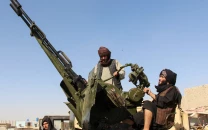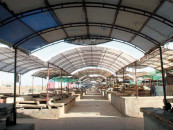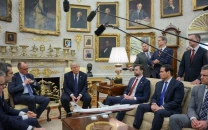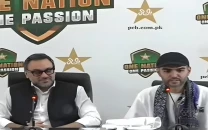Security 2013
Responsibilities that should be handled by civilians but are not, one expects army to assume more responsibility.

The writer is a PhD in conflict studies and an independent security analyst. He has also taught at the University of Central Lancashire, UK
A very positive note is that Pakistan seems to have realigned its focus from external to internal enemies, as a recent statement by the army chief indicates. It is too early to predict what will be the outcomes of this sea change, as LoC transgressions have yet again demonstrated the potential to raise tempers in a flash. There is potential for trade to slowly smooth out relations, as some say that the economic benefits of normalised ties can help overcome contentious issues between India and Pakistan, which will in turn have a ripple effect of preventing Afghanistan from becoming a proxy battleground for the two. Trade has indeed radically altered the geopolitics of the world and may also affect South Asia. The trade between India and China, for instance, is expected to hit $100 billion by 2015. This has implications not just for India and China coming closer, but also induces a negative cost-to-benefit ratio for interventions, using force as an option. Even though it’s too soon to predict what dividends for peace will be gained by Pakistan giving India the most-favoured nation status, it cannot be a wrong step.
It also seems quite unambiguous that the Pakistan Army has proved more robust than its civilian counterparts and is still decidedly popular. In pragmatic calculations, it would perhaps be better for the international community to keep helping the army bolster its professional capabilities, while at the same time, encouraging democracy in Pakistan. There are signs that the army is choosing to adopt a politically neutral stance, which can be encouraged by cheering on the democratic process from the sidelines, not by interventional methods. Such methods have failed in the past and have made actors (like the Americans) decidedly unpopular in Pakistan.
In a world where there is pressure on states to cut defence budgets and on armies to undertake multiple tasks not strictly in their domain, such as peacekeeping and humanitarian assistance, questions such as military job definitions will also be relevant. These become even more debatable when there are weak civilian institutions in developing countries like Pakistan, which are ill-equipped to maintain law and order properly, and force the army to fill the law and order policing vacuum. Once you give responsibilities that should have been handled by the civil establishment but were not, one would expect the military to assume more and more responsibility and congruent authority over time. The civil structures and entities need to be encouraged to grow and professionalise themselves, but in the meantime, the army is the predominant security doctrine generating and implementing organ for lack of a better alternative. This will remain true in the short to medium term and civilian entities, like the National Counter Terrorism Authority and the Parliamentary Committee on National Security, will continue to seek the steer of the army on security issues till they become capable enough to develop their own civilian expertise in the matter.
Published in The Express Tribune, July 16th, 2013.
Like Opinion & Editorial on Facebook, follow @ETOpEd on Twitter to receive all updates on all our daily pieces.















COMMENTS
Comments are moderated and generally will be posted if they are on-topic and not abusive.
For more information, please see our Comments FAQ